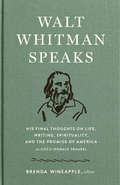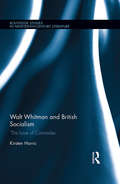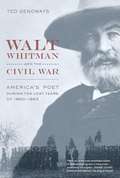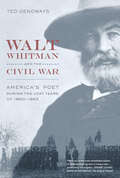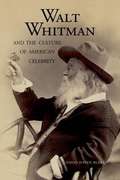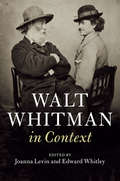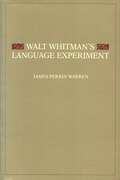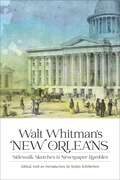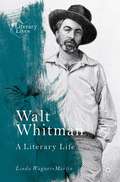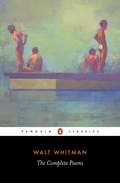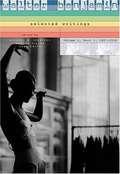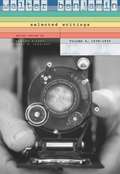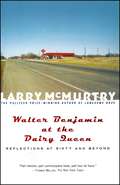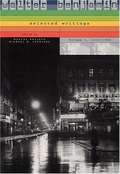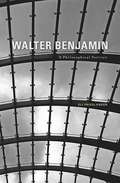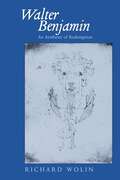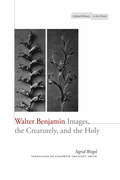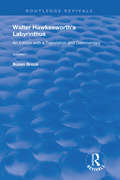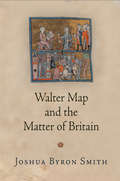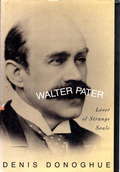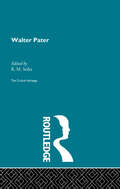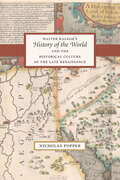- Table View
- List View
Walt Whitman Speaks: A Library of America Special Publication
by Walt WhitmanFor the Whitman bicentennial, a delightful keepsake edition of the incomparable wisdom of America's greatest poet, distilled from his fascinating late-in-life conversations with Horace Traubel.Toward the end of his life, Walt Whitman was visited almost daily at his home in Camden, New Jersey, by the young poet and social reformer Horace Traubel. After each visit, Traubel meticulously recorded their conversation, transcribing with such sensitivity that Whitman’s friend John Burroughs remarked that he felt he could almost hear the poet breathing. In Walt Whitman Speaks, acclaimed author Brenda Wineapple draws from Traubel’s extensive interviews an extraordinary gathering of Whitman’s observations that conveys the core of his ethos and vision. Here is Whitman the sage, champion of expansiveness and human freedom. Here, too, is the poet’s more personal side—his vivid memories of Thoreau, Emerson, and Lincoln, his literary judgments on writers such as Shakespeare, Goethe, and Tolstoy, and his expressions of hope in the democratic promise of the nation he loved. The result is a keepsake edition to touch the soul, capturing the distilled wisdom of America’s greatest poet.
Walt Whitman and British Socialism: ‘The Love of Comrades’ (Routledge Studies in Nineteenth Century Literature)
by Kirsten HarrisThis is the first sustained examination of Walt Whitman’s influence on British socialism. Harris combines a contextual historical study of Whitman’s reception with focused close readings of a variety of poems, books, articles, letters and speeches. She calls attention to Whitman’s own demand for the reader to ‘himself or herself construct indeed the poem, argument, history, metaphysical essay’, linking Whitman’s general comments about active reading to specific cases of his fin de siècle British socialist readership. These include the editorial aims behind the Whitman selections published by William Michael Rossetti, Ernest Rhys, and W. T. Stead and the ways that Whitman was interpreted and appropriated in a wide range of grassroots texts produced by individuals or groups who responded to Whitman and his poetry publicly in socialist circles. Harris makes full use of material from the C. F. Sixsmith and J. W. Wallace and the Bolton Whitman Fellowship collections at John Rylands, the Edward Carpenter collection in the Sheffield Archives, and the Archives of Swan Sonnenschein & Co. at the University of Reading. Much of this archive material – little of which is currently available in digital form – is discussed here in full for the first time. Accordingly, this study will appeal to those with interest in the archival history of nineteenth-century literary culture, as well as the connections to be made between literary and political culture of this era more generally.
Walt Whitman and the Civil War: America's Poet During the Lost Years of 1860-1862
by Ted GenowaysTed Genoways reconstructs those forgotten years--locating Whitman directly through unpublished letters and never-before-seen manuscripts, as well as mapping his associations through rare period newspapers and magazines in which he published.
Walt Whitman and the Civil War: America’s Poet during the Lost Years of 1860-1862
by Ted GenowaysShortly after the third edition of Leaves of Grass was published, in 1860, Walt Whitman seemed to drop off the literary map, not to emerge again until his brother George was wounded at Fredericksburg two and a half years later. Past critics have tended to read this silence as evidence of Whitman's indifference to the Civil War during its critical early months. In this penetrating, original, and beautifully written book, Ted Genoways reconstructs those forgotten years—locating Whitman directly through unpublished letters and never-before-seen manuscripts, as well as mapping his associations through rare period newspapers and magazines in which he published. Genoways's account fills a major gap in Whitman's biography and debunks the myth that Whitman was unaffected by the country's march to war. Instead, Walt Whitman and the Civil War reveals the poet's active participation in the early Civil War period and elucidates his shock at the horrors of war months before his legendary journey to Fredericksburg, correcting in part the poet's famous assertion that the "real war will never get in the books."
Walt Whitman and the Culture of American Celebrity
by David Haven BlakeThis book tells the story of how an obscure Brooklyn poet, better known for his political journalism than verse, immersed himself in the culture of celebrity that was then emerging in the United States. Hoping to redress the mounting divisions in his country, he declared that the poet would become the center of American civic life, that he would command more power and sway than the political representatives he expected to supersede. As Whitman imagined it, the story of celebrity would be the story of democracy. He hoped that the nation's narrow political institutions would undergo an extraordinary transformation once they encountered the populist power embodied in the poet's fame.
Walt Whitman in Context (Literature in Context)
by Edward Whitley Joanna LevinWalt Whitman is a poet of contexts. His poetic practice was one of observing, absorbing, and then reflecting the world around him. Walt Whitman in Context provides brief, provocative explorations of thirty-eight different contexts - geographic, literary, cultural, and political - through which to engage Whitman's life and work. Written by distinguished scholars of Whitman and nineteenth-century American literature and culture, this collection synthesizes scholarly and historical sources and brings together new readings and original research.
Walt Whitman's America: A Cultural Biography
by David S. ReynoldsEmphasizes how his times (1820s through 1890s) influenced his poetry and how he sought to influence a nation through his writing.
Walt Whitman's Language Experiment
by James Perrin WarrenCombining intellectual history with literary analysis, this study of Whitman's language experiment from 1855 to 1892 offers a refreshing new look at his theory of language especially the English language in America—as an expression of a "national spirit" and relates that theory to the language and style of Whitman's major poems and essays. Whitman viewed American English as the most expressive, poetic language that ever existed, and he used his studies of historical linguistics to corroborate that view. Part 1 explicates the theory of language that Whitman developed in his linguistic notebooks, unpublished manuscripts, fugitive essays, and two chapters of the popular book Rambles Among Words. The diction and syntax of the 1855–1856 editions of Leaves of Grass are analyzed to show how Whitman's overwhelming interest in language theories resulted in the "language experiment" of the poems. Part 2 examines the ways in which Whitman's view of language as an expression of the constantly evolving spirit of America subtly shifted to a more cumulative, backward-looking vision of linguistic and spiritual change. Analysis of the diction, syntax, and organization of the last four editions of Leaves of Grass reveals how this shift in vision affected the style of Whitman's poetry and prose from 1860 to 1892. Whitman's groundbreaking poetic style, the author concludes, was a direct consequence of his view of language and the human spirit as dynamic, progressivist, and actively changing within a temporal world. Conversely, Whitman's experiments in both prose and poetry helped confirm his view of linguistic and spiritual evolution.
Walt Whitman's New Orleans: Sidewalk Sketches and Newspaper Rambles (Library of Southern Civilization)
by Walt WhitmanWalt Whitman’s short stint in New Orleans during the spring of 1848 was a crucial moment of literary and personal development, with many celebrated poems from Leaves of Grass showing its influence. Walt Whitman’s New Orleans is the first book dedicated to republishing his writings about the Crescent City, including numerous previously unknown pieces. Often spending his afternoons strolling through the vibrant city with his brother in tow, the young Whitman translated his impressions into short prose sketches that cataloged curious sights, captured typical characters one might meet on the levee, and joked about the strangeness of urban life. Including the first complete run of a fictional, multipart series titled “Sketches of the Sidewalks and Levee,” Walt Whitman’s New Orleans pairs his glimpses of the city with historical illustrations, supplementary texts, detailed annotations, and an introduction by editor Stefan Schöberlein that offers new insights on the poet’s southern sojourn. Whitmanites, history enthusiasts, and lovers of New Orleans will find much to treasure in these humorous, evocative scenes of antebellum city life.
Walt Whitman: A Literary Life (Literary Lives)
by Linda Wagner-MartinWalt Whitman: A Literary Life highlights two major influences on Whitman’s poetry and life: the American Civil War and his economic condition. Linda Wagner-Martin performs a close reading of many of Whitman’s poems, particularly his Civil War work (in Drum-Taps) and those poems written during the last twenty years of his life. Wagner-Martin’s study also emphasizes the near-poverty that Whitman experienced. Starting with his early career as a printer and journalist, the book moves to the publication of Leaves of Grass, and his cultivation of the persona of the “working-class” writer. In addition to establishing Whitman’s attention to the Civil War through journalism and memoirs, the book takes the approach of following Whitman’s life through his poems. Utilizing contemporary perspectives on class, Wagner-Martin provides a new reading of Whitman’s economic situation. This is an accessibly written synthesis of Whitman’s publication history bringing attention to under-studied aspects of his writing.
Walt Whitman: The Complete Poems
by Walt WhitmanIn 1855 Walt Whitman published Leaves of Grass, the work that defined him as one of America's most influential voices and that he added to throughout his life. A collection of astonishing originality and intensity, it spoke of politics, sexual emancipation, and what it meant to be an American. From the joyful "Song of Myself" and "I Sing the Body Electric" to the elegiac "When Lilacs Last in the Dooryard Bloom'd," Whitman's art fuses oratory, journalism, and song in a vivid celebration of humanity. Containing all Whitman's known poetic work, this edition reprints the final, or "deathbed," edition of Leaves of Grass (1891-92). Earlier versions of many poems are also given, including the 1855 "Song of Myself." Features a completely new--and fuller--introduction discussing the development of Whitman's poetic career, his influence on later American poets, and his impact on the American cultural sensibility Includes chronology, updated suggestions for further reading, and extensive notes. Edited, with an introduction and notes by Francis Murphy.
Walter Benjamin
by Howard Eiland Michael W. JenningsWalter Benjamin is one of the twentieth century's most important intellectuals, and also one of its most elusive. His writings--mosaics incorporating philosophy, literary criticism, Marxist analysis, and a syncretistic theology--defy simple categorization. And his mobile, often improvised existence has proven irresistible to mythologizers. His writing career moved from the brilliant esotericism of his early writings through his emergence as a central voice in Weimar culture and on to the exile years, with its pioneering studies of modern media and the rise of urban commodity capitalism in Paris. That career was played out amid some of the most catastrophic decades of modern European history: the horror of the First World War, the turbulence of the Weimar Republic, and the lengthening shadow of fascism. Now, a major new biography from two of the world's foremost Benjamin scholars reaches beyond the mosaic and the mythical to present this intriguing figure in full. Howard Eiland and Michael Jennings make available for the first time a rich store of information which augments and corrects the record of an extraordinary life. They offer a comprehensive portrait of Benjamin and his times as well as extensive commentaries on his major works, including "The Work of Art in the Age of Its Technological Reproducibility," the essays on Baudelaire, and the great study of the German Trauerspiel. Sure to become the standard reference biography of this seminal thinker, Walter Benjamin: A Critical Life will prove a source of inexhaustible interest for Benjamin scholars and novices alike.
Walter Benjamin - Selected Writings, 1927-1930
by Gary Smith Walter Benjamin Howard Eiland Michael William Jennings Ronald LivingstoneIn the frenzied final years of the Weimar Republic, amid economic collapse and mounting political catastrophe, Walter Benjamin emerged as the most original practicing literary critic and public intellectual in the German-speaking world. Volume 2 of the Selected Writings is now available in paperback in two parts. In Part 1, Benjamin is represented by two of his greatest literary essays, "Surrealism" and "On the Image of Proust," as well as by a long article on Goethe and a generous selection of his wide-ranging commentary for Weimar Germany's newspapers. Part 2 contains, in addition to the important longer essays, "Franz Kafka," "Karl Kraus," and "The Author as Producer," the extended autobiographical meditation "A Berlin Chronicle," and extended discussions of the history of photography and the social situation of the French writer, previously untranslated shorter pieces on such subjects as language and memory, theological criticism and literary history, astrology and the newspaper, and on such influential figures as Paul Valery, Stefan George, Hitler, and Mickey Mouse.
Walter Benjamin - Selected Writings, 1938-1940
by Edmund Jephcott Walter Benjamin Howard Eiland Michael W. JenningsEvery line we succeed in publishing today . . . is a victory wrested from the powers of darkness. So wrote Walter Benjamin in January 1940. Not long afterward, he himself would fall prey to those powers, a victim of suicide following a failed attempt to flee the Nazis. However insistently the idea of catastrophe hangs over Benjamin's writings in the final years of his life, the victories wrested in this period nonetheless constitute some of the most remarkable 20th-century analyses of the emergence of modern society. The essays on Charles Baudelaire are the distillation of a lifetime of thinking about the nature of modernity. They record the crisis of meaning experienced by a civilization sliding into the abyss, even as they testify to Benjamin's own faith in the written word. This volume ranges from studies of Baudelaire, Brecht, and the historian Carl Jochmann to appraisals of photography, film and poetry. At their core is the question of how art can survive and thrive in a tumultuous time. Here we see Benjamin laying out an ethic for the critic and artist - a subdued but resilient heroism. At the same time, he was setting forth a sociohistorical account of how art adapts in an
Walter Benjamin at the Dairy Queen: Reflections at Sixty and Beyond
by Larry McmurtryMcMurtry (Pulitzer prize-winning author) read Walter Benjamin's essay about the death of the oral tradition in a Texas Dairy Queen 20 years prior to writing this book. Benjamin's essay serves as a springboard for McMurtry's examination of the lost art of storytelling, the meaning of reading, the death of the cowboy, and the significance of Texas' vast frontier. These are recollections of a cowboy childhood and McMurtry's eventual escape from the life of men and horses and into the culture of books. Annotation c. Book News, Inc., Portland, OR (booknews.com)
Walter Benjamin: 1913-1926
by Walter Benjamin Michael W. Jennings Marcus BullockBenjamin’s sentences provoke us to return to them again and again, luring us as though with the promise of some final revelation that is always being postponed. He is by turns fierce and tender, melancholy and ebullient; he is at once classically rooted, even archaic, in his explorations of the human psyche and the world of things, and strikingly progressive in his attitude toward society and what he likes to call the organs of the collective (its architectures, fashions, signboards). Throughout, he displays a far-sighted urgency, judging the present on the basis of possible futures. And he is gifted with a keen sense of humor. Mysterious though he may sometimes be (his Latvian love, Asia Lacis, once described him as a visitor from another planet), Benjamin remains perhaps the most consistently surprising and challenging of critical writers.
Walter Benjamin: A Philosophical Portrait
by Eli FriedlanderWalter Benjamin is often viewed as a cultural critic who produced an array of brilliant and idiosyncratic pieces of writing with little more to unify them than the feeling that they all bear the stamp of his 'unclassifiable' genius. This book argues that Benjamin's corpus of writings must be recognized as a unique configuration of philosophy.
Walter Benjamin: An Aesthetic of Redemption (Weimar and Now: German Cultural Criticism #7)
by Richard WolinFew twentieth-century thinkers have proven as influential as Walter Benjamin, the German-Jewish philosopher and cultural and literary critic. Richard Wolin's book remains among the clearest and most insightful introductions to Benjamin's writings, offering a philosophically rich exposition of his complex relationship to Adorno, Brecht, Jewish Messianism, and Western Marxism. Wolin provides nuanced interpretations of Benjamin's widely studied writings on Baudelaire, historiography, and art in the age of mechanical reproduction. In a new Introduction written especially for this edition, Wolin discusses the unfinished Arcades Project, as well as recent tendencies in the reception of Benjamin's work and the relevance of his ideas to contemporary debates about modernity and postmodernity.
Walter Benjamin: Images, the Creaturely, and the Holy
by Sigrid WeigelArguing that the importance of painting and other visual art for Benjamin's epistemology has yet to be appreciated, Weigel undertakes the first systematic analysis of their significance to his thought. She does so by exploring Benjamin's dialectics of secularization, an approach that allows Benjamin to explore the simultaneous distance from and orientation towards revelation and to deal with the difference and tensions between religious and profane ideas. In the process, Weigel identifies the double reference of 'life' to both nature and to a 'supernatural' sphere as a guiding concept of Benjamin's writings. Sensitive to the notorious difficulty of translating his language, she underscores just how much is lost in translation, particularly with regard to religious connotations. The book thus positions Benjamin with respect to the other European thinkers at the heart of current discussions of sovereignty and martyrdom, of holy and creaturely life. It corrects misreadings, including Agamben's staging of an affinity between Benjamin and Schmitt, and argues for the closeness of Benjamin's work to that of Aby Warburg, with whom Benjamin unsuccessfully attempted an intellectual exchange.
Walter Hawkesworth's Labyrinthus: An Edition with a Translation and Commentary Volume I (Routledge Revivals)
by Walter HawkesworthOriginally compiled and published in 1988, this vole contains the full text and translation of Walter Hawkesworth's Labyrinthus, alongside textual and critical notes, including essays on the author, the staging and the style and language. This is the first of two volumes.
Walter Hawkesworth's Labyrinthus: An Edition with a Translation and Commentary Volume II (Routledge Revivals)
by Walter HawesworthOriginally compiled and published in 1988, this vole contains the full text and translation of Walter Hawkesworth's Labyrinthus, alongside textual and critical notes, including essays on the author, the staging and the style and language. This is the second of two volumes.
Walter Map and the Matter of Britain (The Middle Ages Series)
by Joshua Byron SmithWhy would the sprawling thirteenth-century French prose Lancelot-Grail Cycle have been attributed to Walter Map, a twelfth-century writer from the Anglo-Welsh borderlands known for his stinging satire, religious skepticism, ghost stories, and irrepressible wit? And why, though the attribution is spurious, is it not, in some ways, implausible?Joshua Byron Smith sets out to answer these and other questions in the first English-language monograph on Walter Map—and in so doing, he offers a new explanation for how narratives about the pre-Saxon inhabitants of Britain, including King Arthur and his knights, first circulated in England. Smith contends that it was inventive clerics like Walter, and not traveling minstrels or professional translators, who popularized these stories. Smith examines Walter's only surviving work, the De nugis curialium, to demonstrate that it is not the disheveled text that scholars have imagined but rather five separate works in various stages of completion. This in turn provides new evidence to support his larger contention, that ecclesiastical networks of textual exchange played a major role in exporting Welsh literary material into England.Medieval readers incorrectly envisioned Walter withdrawing ancient Latin documents about the Holy Grail from a monastery and compiling them in order to compose the Lancelot-Grail Cycle. In this detail they were wrong, Smith acknowledges, but a model of literary transmission that is not vernacular and popular but Latinate and ecclesiastical demands our serious consideration.
Walter Pater
by Denis DonoghueA TWENTIETH-CENTURY intellectual of the first rank presents the case for the nineteenth-century aesthetician whose elegant subversions delivered us to modernism. Walter Pater (1839-1894) was an obscure Oxford don until 1873, when his first book, The Renaissance, exposed his argument favoring sensation over though and, in doing so, ignited a hard, gem-like flame. "Say not what it is but what it makes you see--or feel" is not something Pater ever said, but it will suffice as an encapsulation of an attitude that moved the authority of a work of art from the object to the subject, subsequently outraging the defenders of perceived truth of his time and making Pater himself a figure of controversy and even ridicule. Substituting sensationalism for sensation and reading Pater's claim for hedonism, or pleasures the soul might savor, as outright decadence, Pater's detractors far outnumbered and outranked his followers (including his fellow Oxonian and most notorious devotee, Oscar Wilde). But ever since Pater has proved, at least in the high arts, the decisive victor of the revolutions he set into motion. Denis Donoghue presents what will stand as the premier inquiry into Walter Pater's life and ideas: a work of compelling erudition unrivaled in intuitive and intellectual force, revealing with eloquence, charm, and abundant yet measured discourse Pater's centrality to the entire modernist movement. "Pater is audible," Donoghue writes, "in virtually every attentive modern writer--in Hopkins, Wilde, James, Yeats, Pound, Ford, Woolf, Joyce, Eliot, Aiken, Hart Crane, Fitzgerald, Forster, Borges, Stevens." Walter Pater: Lover of Strange Souls is both an education and an inspiration for anyone at all concerned with the changing character of latter-day Western culture. Here, without question, is a classic: a critical biography that lays open the very making of the culture that both assails and sustains us.
Walter Pater: The Critical Heritage (Critical Heritage Ser.)
by R. M. SeilerFirst Published in 1995. Routledge is an imprint of Taylor & Francis, an informa company.
Walter Ralegh's History of the World and the Historical Culture of the Late Renaissance
by Nicholas PopperImprisoned in the Tower of London after the death of Queen Elizabeth in 1603, Sir Walter Ralegh spent the next seven years producing his massive "History of the World. "Created with the aid of a library of more than five hundred books he was allowed to keep in his quarters, this incredible work of English vernacular would become a best-seller with nearly twenty editions, abridgments, and continuations issued in the years that followed. aNicholas Popper uses RaleghOCOs "History" as a touchstone in this lively exploration of the culture of history writing and historical thinking in the late Renaissance. From Popper we learn why early modern Europeans ascribed heightened value to the study of the past and how scholars and statesmen began to see historical expertise as not just a foundation for political practice and theory, but a means of advancing their power in the courts and councils of contemporary Europe. The rise of historical scholarship during this period encouraged the circulation of its methods to other disciplines, transforming EuropeOCOs intellectualOCoand politicalOCoregimes. More than a mere study of RaleghOCOs book, PopperOCOs book reveals how the methods historians devised to illuminate the past structured the dynamics of early modernity in Europe and England. "
